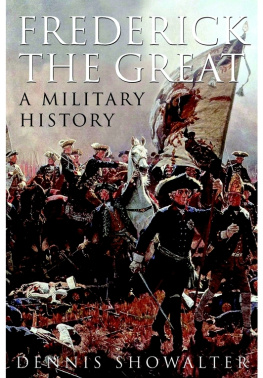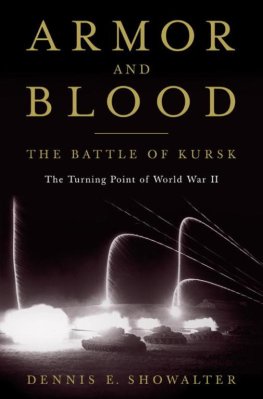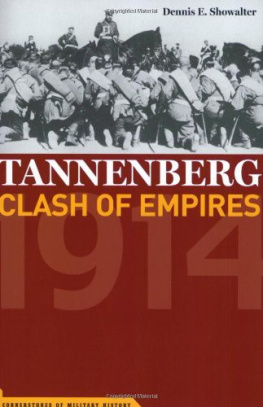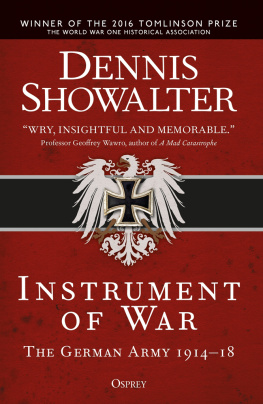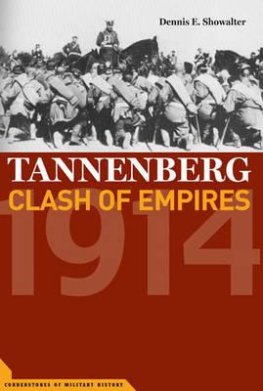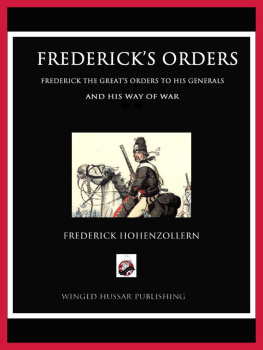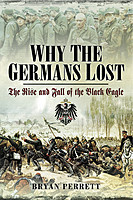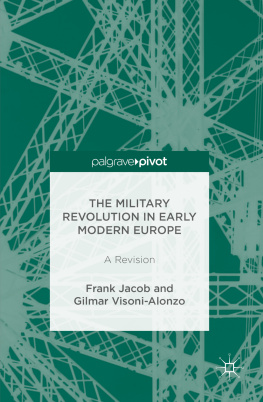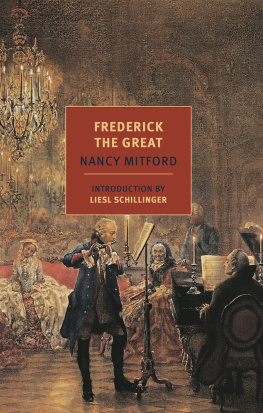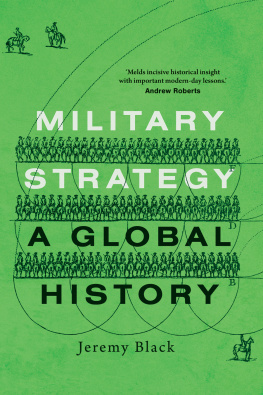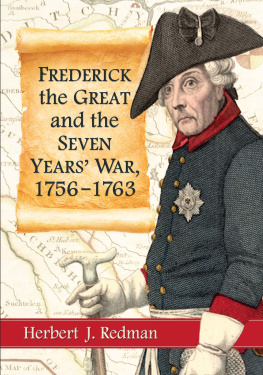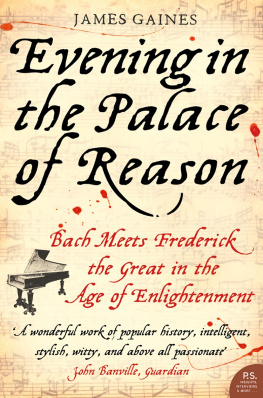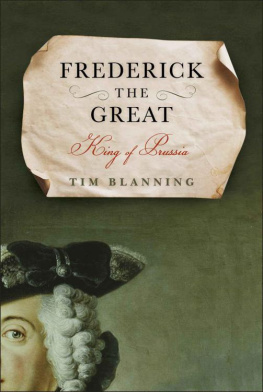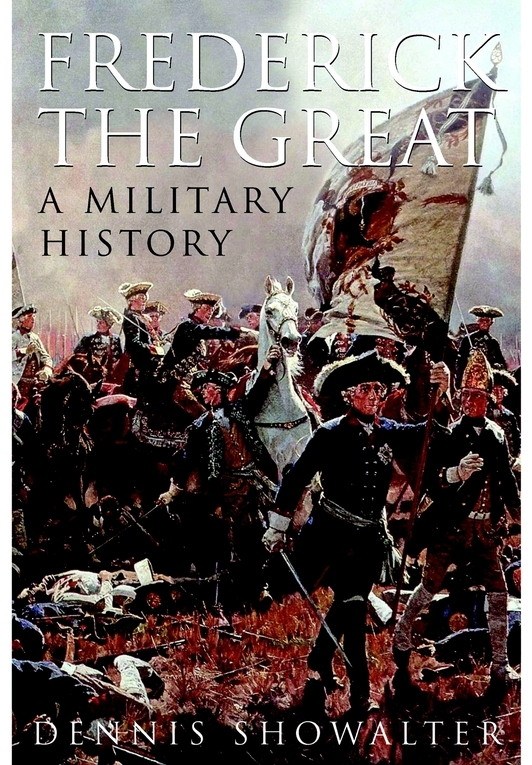Reflections
I n 1937, the Infantry Journal published An All-Time Command Team for a then state-of-the-art army corps. The author chose as his commanding general Frederick the Great, praising him as a strategist able to tell the difference between good and bad advice, a strong disciplinarian, and successful in sustaining domestic political support.
Understanding the wars of Frederick the Great depends on understanding two general points. The first is that at operational levels, deadlock is wars normal condition. Armed forces tend to learn from each other, copying and adapting behaviours and techniques to suit their own dynamics. Napoleons achievements from Marengo to Aspern, the panzers string of victories between 1939 and 1941, even the triumph of the NVA over the U.S. expeditionary forces in Vietnam all are exceptions reflecting the exploitation of windows of opportunity, that close more or less rapidly, depending on how vital a given conflicts stakes are to the participants.
Nothing essential to Fredericks way of war was inherently unique to Prussia. The Austrians, the Russians, even the French were able between 1740 and 1763 to overhaul their military systems to a point where even Fredericks skills as strategist and commander could do no more than force a long end-game. States and statesmen rolled the iron dice of battle as a means of improving negotiating positions, but also for the games own sake. War can be intoxicating at all its levels from the front line to the council chamber. Victory offers at least the promise of cutting the Gordian knot of agreements, expectations, and premises that sustain any system involving sovereign powers. Mutually-enhanced proficiency, however, tends to confirm stasis at higher levels of intensity a point highlighted by the Seven Years War. Prussia was ultimately saved from defeat, perhaps destruction, not by the military genius of its ruler, but by the death of Russias Empress Elizabeth and her temporary replacement by an extreme Prussophile. Once Russia left the war the remaining combatants collapsed from mutual exhaustion, as much relieved to have found an excuse to stop fighting as frustrated by the wars outcome.
Wars tendency towards stasis enhances the importance of politics as a means of resolving conflict not as a second-best solution, but a desirable norm. Before 1740 and after 1763 Europe faced a continuing series of diplomatic crises and small wars, all constantly threatening to escalate out of control. One of the taproots of balance was intellectual. The Age of Reason informed by lsprit gometrique discouraged heroic vitalisms of all kinds. A second taproot was historical. The experience of two bitter centuries showed that even the most powerful states neither controlled sufficient surplus resources nor possessed sufficient capacity to mobilize the resources at their disposal to sustain a position as primary power, let alone that of hegemon. Overstressed internal structures resulted in domestic gridlocks just as detrimental to vaulting ambition as were the hostile international coalitions such ambitions tended to produce.
This state of affairs did not exclude the possibility of the significant aggrandizement of particular states. It did mean that such aggrandizement was best sought in the context of existing systems. From his earliest days on the throne Frederick sought not to overthrow the balance of Europe, but to adjust that balance in Prussias favour. But how could that outcome be best secured? States are like bridge players. They tend to lead from strength, or perceived strength. Prussias history was that of a minor power. Prussias economy illustrated at best the capacity to make bricks with a minimum of straw. Prussias society was highly regimented in a Europe where daily life was virtually libertarian by twentieth-century standards. Prospects, in short, for generating a bandwagon effect scarcely existed. Instead, developing Prussia as a model for other ambitious states meant a risk on one hand of generating a hostile coalition against a paradigmatic threat, and on the other of destabilizing the very great powerful system Frederick sought to join as a full member.
The challenge for Prussias King, therefore, involved pushing the envelope: adjusting Europes structure without denying its principles. In this context Fredericks demonstrated disinterest in creating new military paradigms represents less a failure of vision than a conscious decision. His army was designed to maximize the war-making potential of Prussias social contract. The states government, economy, and society were placed at the service of a military machine intended to strain the kingdoms resources, but not exhaust them. The army was structured to maximize its efficiency under existing conditions of warfare. Its training, its discipline, and its tactics were refinements rather than innovations. In an age when battles were decided by the firepower of linear formations and victory was completed by cavalry charges, Prussian infantry could deliver more rounds per minute than any of their European counterparts. Prussian cavalry could strike harder, rally more completely, and appear more quickly where needed than any other horsemen on the continent. In an age when manoeuvre in the face of an enemy risked disruption by counterattacks, Fredericks battalions could change from columns of march into lines of battle so rapidly that the process seemed almost magical. The famous oblique order, with one flank of the army weighted heavily and echeloned forward to roll up the enemy, depended as much on quickness of deployment on the field as on pre-battle planning.
Balance was intended to prevent empire rather than preserve peace. Nor did it guarantee the position of lesser players. Alliances were intended for expansion and acquisition as well as for security. Prussian territory was spread in fragments from the Rhine to the Memel. Prussia was a correspondingly obvious target in an international system that by 1740 was clearly suffering from multiple tensions likely to destabilize it in the near future.
The death of Austrian Emperor Charles VI was, for Frederick, a catalyst. The Prussian King legitimately expected the Habsburg Empire, now ruled by a young and inexperienced woman, to be challenged on all of its frontiers by all of its neighbours. In such a context Prussia must be either hammer or anvil. To stand aside was to invite Brandenburgs fate in the Thirty Years War: ravaged by all, respected by none. War, moreover, offered a tempting prize. The Austrian province of Silesia offered human and material resources that, properly utilized, would enable Prussia to become a European power of the first rank. The Prussian army, ready for war from a standing start, should be able to secure Silesia and hold it against all comers while Frederick legitimized the new order by negotiations.
This calculation determined the course of Prussian policy for over two decades because it was such a spectacular miscalculation. From Mollwitz in 1741 to Hohenfriedberg in 1745, the Prussian army established itself as the new master of Europes battlefields. Frederick displayed the diplomatic virtuosity of a riverboat gambler, making and abrogating treaties, concluding and abandoning alliances, with breathtaking audacity. Yet Austria and its Empress Maria Theresa remained unreconciled to the new status quo, while the Kings behaviour created enough mistrust among his neighbours that by 1756 France, Russia, and Austria formed a grand alliance whose major aim was, if not to destroy Prussia completely, then to reduce it definitively and permanently to the status of a middle-ranking German state. By 1756 Frederick stood alone in a sea of enemies, his only support an English connection that never became more than a relationship of convenience.

